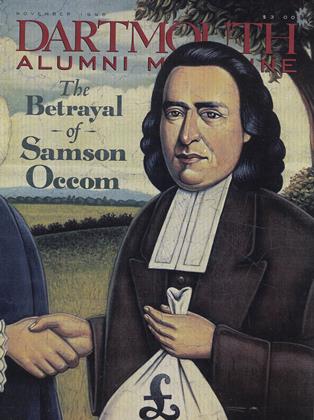As a rule, a Ph.D. is a good thing. Occasionally, so are exceptions to the rule.
ONE OF THE THINGS a good college prides itself on is the high proportion of Ph.D.s on its faculty. By this standard, Dartmouth does respectably. Even quite well. For example, of the 246 faculty members with tenure, only one has neither a Ph.D. nor any of the other advanced terminal degrees, such as the M.F.A.
But it's something quite different I am proudest of the College for. It has or at least it used to have the courage and selfassurance to recognize merit even when unaccompanied by an advanced terminal degree. I'm thinking especially of the case of Pyotr Jarotski, who for 12 years taught Russian at Dartmouth.
Pyotr Jarotski, who is still alive and currently 100 years old, was born into a family of Russian gentry in St. Petersburg. When he was 19, the Revolution came. Most of his family were put to death for the crime of being well-born; he himself escaped to Latvia. When the Soviet Union took over Latvia, he fled to Berlin. When Berlin fell to the Communists in 1945, he went into hiding.
In 1950 he and his Latvian wife came to the United States, sponsored by Professor John Adams of Dartmouth's history department. He came straight to Hanover, and took a job at the College as a baker in Thayer Hall.
A dozen years go by. These are years when American interest in Russia is intense. At Dartmouth there is a summer institute which trains high school teachers to teach Russian.
In the summer of 1962 one of the instructors at the institute (they come from all around the country) falls sick at the last moment. Suddenly the baker is plucked from Thayer Hall. He proves to be so brilliant a teacher of Russian language that the College's department of Russian hires him as a lecturer. He is 64 years old.
Jarotski teaches at the College from 1962 to 1974, finally retiring at the age of 76. Some students l have known several regard him as one of the two or three best teachers they had.
What's especially interesting to me is the way he appeared in successive Dartmouth catalogues. He first turns up in the 1962-63 catalogue as Mr. Peter Jarotski, instructor in the Russian language. No degree is listed, because he had no degree. Just a perfect command of High Russian, and as his colleague Walter Arndt recalls, a fierce devotion to the language, a wonderful smile, and a copperplate hand.
Two years later, in the 1964-65 catalogue, he has become Peter Samoilovich Jarotski, B.S. Not because at age 66 he became a bachelor of science, but because a naked name clearly seemed indecent to someone on the catalogue staff. A year later the B.S. vanished. By 1971 he had settled down to being a degreeless senior lecturer in Russian language and literature.
A Ph.D. is a good thing. If nothing else, possession of one proves you're serious about your vocation no one would go through all that work if he or she weren't. But room for an occasional exception to rules is also a good thing. Sometimes I worry that as Dartmouth gets bigger (as we are still doing, assurances to the contrary notwithstanding) and as another layer of bureaucracy develops, there will be no more room. The next time fate offers us a brilliant baker, or a master book-person with no degree in library science, will we rise to the occasion? Or will we consider only the safely certified?
 View Full Issue
View Full Issue
More From This Issue
-
 Feature
FeatureThe Betrayal Of Samson Occom
November 1998 By Bernd Peyer -
 Feature
FeatureThe Mystery of the Tao
November 1998 By Rebecca Bailey -
 Feature
FeatureSails for the America's Cup
November 1998 By Fred Hapgood -
 Cover Story
Cover StoryThe Inauguration
November 1998 -
 Article
ArticleThe Problem with Romantics
November 1998 By Kathleen Burge '89 -
 Class Notes
Class Notes1979
November 1998 By Jeffrey D. Boylan, R. James "Wazoo" Wasz
Noel Perrin
-
 Books
BooksTHE CHRISTENING PARTY.
February 1961 By NOEL PERRIN -
 Books
BooksTHE DISPLACED PERSON'S ALMANAC.
March 1962 By NOEL PERRIN -
 Books
BooksWhich Came First?
March 1976 By NOEL PERRIN -
 Article
ArticleThe Faculty's Turn to Give
NOVEMBER 1996 By Noel Perrin -
 Article
ArticleFour Aces
SEPTEMBER 1998 By Noel Perrin -
 Article
ArticleArtists 22, Philistines 14
OCTOBER 1999 By Noel Perrin
Article
-
 Article
ArticleT. C. NATHAN EX-'19 KILLED
April 1918 -
 Article
ArticleThe action of the Board of Trustees in electing Doctor John M. Gile '87
March, 1923 -
 Article
ArticleIndian Students Denounce Symbols
JANUARY 1972 -
 Article
ArticleAround the Ivies
APRIL • 1987 -
 Article
ArticleA DARTMOUTH MAN AT THE FRONT
December, 1915 By Alexander John Marshall Tuck, '14 -
 Article
ArticleMedical School
FEBRUARY 1972 By BLISS KIRBY THORNE '38


